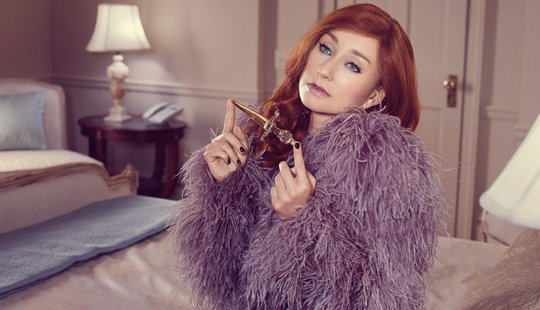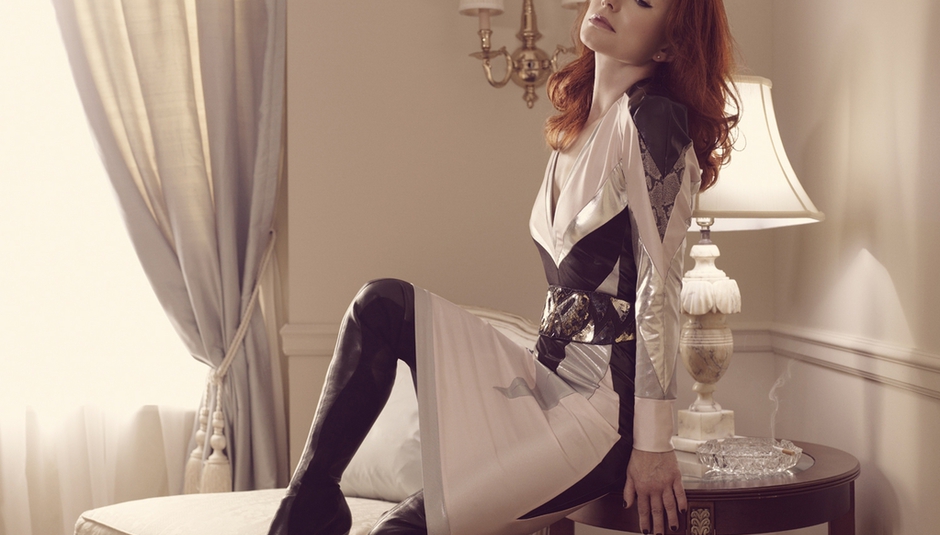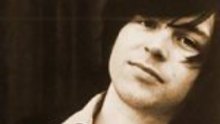Interviewing bands as a fan or as a journalist is all well and good but there's only so much insight a 'critic' has. Musicians are like a totally different breed and if we've learnt one thing from our takeover weeks, it's that musicians talking to each other is incredibly illuminating. We're yet to come up with a great title for this new feature (Artist-on-Artist, Peer-to-Peer, Muso-mush...) but the concept of getting musicians we like to interview each other is a definite goer. Coming up next week, we have Ed from Grizzly Bear interviewing his band of the moment Phoenix, and Frederick Blood-Royale from Ox.Eagle.Lion.Man. talking to The Mars Volta.
To kick this series off we have one of our tips for 2009 Catherine A.D. speaking to the legendary Tori Amos about her new album Abnormally Addicted to Sin.
Waiting in the lobby of the designated Kensington hotel, the concierge asks me again if there's anyone they can call. The interviews are running late and I am conspicuously out of place amidst the beige on beige. It's like sitting in a room made of mashed potato. Which only serves to make me more hungry. I surreptitiously sneak bites from a Crunchie from my bag - I haven't eaten lunch yet and I don't want to pass out mid-interview. I’m trying not to get chocolatey crumbs all over The Beige but then think I might need to follow the crumb trail later to find my way out of the neutral labyrinth of endless, uniformly buff corridors... Finally the PR arrives to take me upstairs and the Sunday Times photographer is busy setting up shots in the adjoining room with one scary-ass freakishly-real looking baby-doll as a mooted prop. There is more beige. I am feeling like I might vomit up a chocolatey mess any moment. And then, suddenly, there is Tori Amos. Resplendently red and orange, and immediately intuiting how out-of-place I feel here.
"You are very artistic - you are the most artistic person I've met.. I've had the BBC here this morning and trust me, it's a very different look... this is gorgeous...you are a walking art piece - that's what you are - it does show and that is a positive thing and it's got to make you feel good - that's who you are and you are doing the right job"
And this is Tori: generous, intuitive, warm and welcoming. Putting you at ease with her languid, almost meditative, way of talking, unravelling each answer with nothing of the polished PR babble we have come to expect from today's generation of stars. We decide to up sticks from the (beige) sofa and armchairs and both end up perched on the huge windowsill that overlooks Kensington Gardens and the gathering crowds of lunchtime picnickers and Princess Diana pilgrims. I enquire about how she's feeling after having to postpone her show two days previously, only to find myself in the unexpected position of discussing the joys of food poisoning with Tori Amos... We try to figure out the finer points of the acoustics of the room and where the best position for the dictaphone might be - both laughing that you can never escape the producer and the musician in you. Perched on a book, atop wood (for the best resonance) is the solution decided upon. And so we dive in...
CAD: The new record is called Abnormally Attracted to Sin. Are there any particular ones you’re attracted to more than others? Could you expound upon the title? Obviously it’s a quotation from some Guys & Dolls dialogue...
TA: I’m sort of attracted to… figuring out why people are attracted to what they are... because… you know, I have a sister that’s a doctor, and sometimes she’ll talk to me about… “This is not an emotional conversation – there’s something within the body and the brain that’s attracting somebody to something.” It’s this whole [Lacuna, implying Emotion, the Unknown human element, etc.] “Versus Genetics and Sociology question”, and I’m fascinated by... why people choose a self-destructive path.
CAD: And so that’s being drawn to the Dark Side as it were? That it’s maybe not a choice, but perhaps it’s something genetically inbuilt, or predisposed?
TA: Well, I don’t know. I think we’re all drawn to [it]. There’s so many answers in the dark, but it doesn’t have to be malevolent; it can be a place where Shadow exists [the Jungian Shadow, presumably], and you find… you bring your candle, and you bring your flashlight with you, and you try to find consciousness in the unconscious. I kinda see the darkness as the unconscious; a metaphor. It doesn’t have to be about… again, violent behaviour towards another creature – it doesn’t have to be about harm – and I’ve always sort of seen a different definition of Lucifer, the Light-bringer, as… it’s a tough job to hold, but a consciousness that holds all of that – of Humanity – that we don’t collect into ourselves, the sides of ourselves that we don’t claim; the things we do, how we manipulate, that we kind of lie to ourselves. Because, you know, nobody wants to really think – most people anyway that are sort of walking my line, that I am going to intentionally belittle somebody but it's sometimes from friends... it’s sometimes the people we pull into our circle, [when] they don’t say “God, you did a great job today", or "Congratulations or I support you or those things”. [Instead] they leave you with very little, so you start to crave… and you’re attracted to their acceptance, approval, support… that they Just-Never-Give-You, and the way they keep you there is by withholding it. And so in ‘Ophelia’ [a track from the new album] which is the classic song, it's like, “Why would you want people like that in your life”?
CAD: So, in a way, seeking approval from those who withhold it most, rather than accepting and embracing the approval that we already have in our lives…?
TA: That’s right – and why aren’t we attracted to people who want to support us and who like us? Instead of being attracted to people who don’t see our light? Thinking, “Oh God, if I can turn this person around, then I must be onto something here…””
CAD: It’s a really good question! Very personally resonant as well as a musician… But on the other side of that, I wanted to talk about the single ‘Welcome to England’ which seems to me in some ways to be an ode to your husband, as well as – obviously – about England and estrangement. I wondered whether it’s harder for you to write what you might call “a positive lovesong”, rather than the songs from Boys for Pele, like ‘Putting the Damage On’ or ‘Hey Jupiter’?
TA: Well, I think…… to be positive about a man, and yet ambivalent about a place, was the desired goal for ‘Welcome to England’, because I really wanted the story to be about a woman who left her life, and her family, and her job, to follow her love – to follow her heart. It could be leaving North Carolina to move to New York – it could be anything – or leaving Manchester to come to London. Then you come to realize that His world is becoming Your world, and yet maybe you’ve taken on so much of His world… but it isn’t Your world, and you have to retain yourself in it. And she just lost that. Somehow. She lost parts of herself – whether she should have gone back more, or whether she… you know, sometimes when you leave a place, you cut those cords, and you think “Okay, fresh start – roll my sleeves up…” and yet… there was something, or maybe many things, that you didn’t really want to leave behind. That you do begin to miss. Sometimes it’s the mountains. Sometimes it’s the earth. And I think that ultimately – in this story she’s an American, and Yes, the parallels are very close – but it could be… I know so many people who’ve left, especially in the last 2 years because of jobs, and getting work. One of them had work [that was] going somewhere, that they'd had to leave. One of them has had to let go to move with the other, and so, “how to not lose yourself, when you don’t fit into your lover’s world” [is the message] – maybe that’s a good thing, because I don't think you necessarily should.
CAD: There seems to be a lot of songs on the record about this idea of Giving – this almost quasi-vampiric relationship, maybe. Especially in the first song, ‘Give'...
TA: Yes...
CAD: ...And all the mothers 'giving' on the record too... and so I wondered if maybe you saw your songs in that way? There were a lot of songs on this record that strongly suggested this idea of “giving” through the songs, and using them as a way to connect to people, and as a way to love. I can’t remember the exact lines, but you say something like: “some people give blood / I give love”. Could you elaborate on that idea?
TA: Well, I guess it’s the polar opposite of the vampire concept, where you don’t need to take from somebody, but… there’s a fine line in giving, and… being a watercolour that just runs off a canvas, where you give… so much that you don’t allow people to give back. Sometimes, there’s a fear of Receiving, because… that’s a strange place to put yourself in, but I’ve seen this and walked into this at different points in my life, where I’ve said “I don’t need anything from anybody”, then when you do receive something from somebody, it’s a lovely gift… but in being the only giver sometimes, you take away the other person’s opportunity to want to offer something up of themselves as well; and so, there’s a fine line. How far do you take this? There’s a danger element to it, like anything that can be taken too far. But I think that it was a really sexy idea, I thought, that to survive a time now [when] nothing’s abundant, everything is bleak, everybody’s pennypinching, that the way to survive destruction is to “out-create” it, so I think the idea was when everybody wants to take, “No, don’t don't try to take – you give”.
CAD: So, it’s about trying to reverse the order of things? To me, hearing you talk about that, it’s a very nice link on to the other idea that runs so strongly throughout the new album, of Motherhood - especially on ‘Maybe California’. How has motherhood has impacted not only your relationship with music, but also your life, and your "job" as a musician and a creator. How has that changed?
TA: I think as Tash gets older – she’s 8 now – she’s got to a place where she has her own ideas, and they’re very exciting and independent of mine and her Dad's. She’s in a new phase now, and I’m having to grow with it. I think… because she’s more independent, I’ve been able to give more attention to The Art, in the last few years. And so, I’m changed forever, being a Mom, because I think – my body changed, first of all, and I could see what a woman’s body can do… and when I was at my biggest, I think I was most freed of all those demons – there were so many! They just got kicked out of my being… maybe with her feet! [both laugh] Even though she was a Caesarean birth, for medical reasons… I believe that… by accepting my physicality, that was a huge shift… for me, as a Creator, and as a Woman, and there’s more of a… a sensuality I think in some ways, to the work… that is there, where[as] the work prior to Tash, has other elements that you can only have before you’ve carried life… I can’t… I don’t know that consciousness anymore, because once your body takes on another person, you can’t be a maiden anymore.
CAD: There is no going back is there?
TA: There’s no going back. You can’t know that emptiness anymore – and I don’t mean “emptiness” as a negative, I mean: you’ve been filled with another creature, and so… always & forever, that cord is real, and it’s pulling at you, and your consciousness shifts. The question is: how do you walk the line of Mother and Woman… independent of Mother, and that’s a challenge because I think some mothers, they can look back, and as much as they love their children… there’s something very sensual when your body’s your own.

CAD: Something that seemed to come through in the story of ‘Maybe California’ is this tension about a woman being driven to such a point where she wants to leave her children, she wants to leave the world, even... and the responsibility of the damage she could do if she did chose to take that route, and [so] the question of 'Giving' comes up again.
TA: It keeps coming up... I mean.. there’s a selfishness, and there’s a battle of selfishness, and a battle between… not selflessness… but the question of “what is self”. If you’re a Mother-Creator, then self has to include the Other. “Mother” includes the word “Other”, and… I don’t think I really realized that until recently. I mean it’s staring at us in the face. Whereas “Woman”… the word “Man” is included – and “Wo” is included… [unclear whether Tori means “Woe” or “Whoa” here...] it’s a different kind of Other. I think “Mother” can embrace what it took to get her there, which is sexuality.
CAD:...which is quite a radical way of thinking – this idea of sexualizing the mother, or even being a sexualized woman after you’ve given birth, or whilst you’re pregnant even, is taboo, isn’t it?
TA: It is taboo. And I think, with the new record, and the artwork, it’s very much about the idea of erotic spirituality. You know, I think when we were creating the photographs, they were being created while the music was playing, and the conversation… was very much with an Other, and the songs themselves, and what was behind that… and I think… sometimes as Mothers, you’re kind of amputated from the idea of the “Erotic”. Because, just the idea that “that woman that is holding that whip” [say], the idea that in two hours that woman can be sitting down, at a Haagen-Dazs, or (Tasha’s favourite) is Gladstone’s in the States, where they make the little ice-cream. But, the truth of the matter is that it depends on the temple – the temple of the Holy Spirit – and inside of that whip, and what's on the other side of that whip because that’s really metaphorical. To me, the pictures – the handcuffs, the whip – it’s very much about a mental-emotional conversation with… herself, or with this… Lover.
CAD: So, it’s saying that we must tend to ourselves as Women in order to be good mothers, to retain our integrity?
TA: You have to do both - there’s a balance. It really is about a balance, and when you let the woman go, then sometimes you find as the children are growing up, that we go back to ‘Welcome to England’ [the song] – you're that woman again – who, if you don’t give to yourself, but you are giving to everybody else, that you turn around, and you recognize but "I have nobody to give to anymore, and I haven't nurtured myself while I've been nurturing everybody else".
Abnormally Attracted to Sin is out now on Island Records. The deluxe edition of the album features a bonus DVD containing 16 “visualettes” directed by Christian Lamb.
Go to blogs.myspace.com/catherineAD to read the full length interview transcript between Tori and Catherine.
Tori Amos has just confirmed her UK tour dates for September 2009, including: 6th Sept Manchester Apollo, 7th Sept Birmingham Symphony Hall, Sept 8th Glasgow Royal Concert Hall and London HMV Hammersmith Apollo on September 10th.
Catherine AD will play Latitude Festival on the Nick Cave day (Sunday 19th June) and is performing at a special CRISIS gig this Monday 25th May with David Gilmour and Amadou & Mariam.























